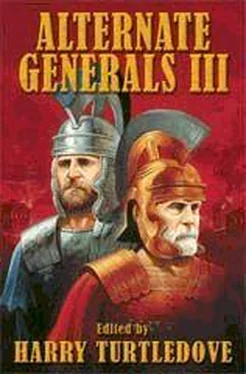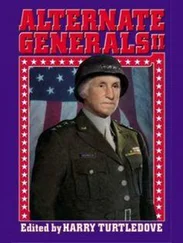She opened her mouth to offer a polite response, realized just what he was offering, and shut it again. A tug on the reins and she was free of his presumptuous hand, with the bonus that her horse's hoof pressed Cumberland's foot into the sand-not, alas, against a rock. He jerked back with a vicious oath.
"You are very welcome," she said to the other officers, and to the Duke of Cumberland she said, "I hope, Your Grace, that you will never find cause to appear in this part of the world again."
"God forbid, woman, God forbid."
Amen , Flora added to herself.
He turned toward the approaching boat, favoring his foot, but shook away Campbell's supportive hand. Ripping off his outer clothing, the duke stamped them in disgust into the sand and seaweed. No hope of returning the dress to Betty, then.
Flora urged her horse toward the path. Behind her she heard the boat's keel scrape against the sand, and the voices of Campbell and Scott identifying themselves and their superior. In return came the greetings of the ship's officer, and then something she had not expected to hear at all, laughter, quickly shouted down.
She gained the top of the hill, prodded her horse into a trot, and did not look back.
* * *
Armadale, Isle of Skye, April 20, 1746
Her mother greeted Flora at the door, the candle in her hand guttering in the wind. "Come sit yourself down by the fire. I'll tell Betty to bring bread, cheese, and porter."
In the parlor Flora found Allan waiting. Politely he stood up and offered her his chair. She folded her aching limbs into it and extended her icy hands toward the fire burning hot and fragrant above the stack of peats.
"I'm pleased to see you returned safely," he said.
"I fell in with a troop of MacLeods, and they escorted me home."
"Our-guest is now safely aboard ship?"
"Aye. He is that."
"And not grateful for our help, I daresay."
"Not especially." She did not tell Allan about the duke's last offer, or else her cousin would have hunted him down and shot him where he stood. "And you? I trust you slept well?"
"Much too well. When I awoke the dawn was past. But when I hurried to make my appointment on the field of honor I found the door locked. Your mother would only open it when I gave her my word not to follow you." Allan shook his head. "There was no need to lock me in, Flora. If Cumberland chose to flee this battle, just as he fled the battle at the Spey, it is no reflection upon me."
"Very true."
"However, it would be better if we never told anyone that part of the story."
Flora considered the leaping flames reflected in Allan's eyes. Please God he would never realize that her entire plan had been intended to protect him from himself, even to denying his rank to the duke and his men. If she could hardly bear to see her dashing cousin humiliated, neither could she tolerate his anger. And he would be irrational enough to be angry, not grateful. "I shall never speak a word of it. Although I daresay no one will have enough interest in the story for me to speak at all."
"Like as not," Allan conceded. "Cumberland, I suppose, will return to the war on the Continent. A pity he proved unsuccessful in performing the task for which he was recalled to Britain. An enemy on its northern border will distract England from its task in Europe, to quell the power of France. But that need not concern us." Allan laid his fingertips gently on side of her face. "Now, Flora, I have been speaking with your mother…"
She leaned into his touch with a sigh as much resigned as relaxed. In time she would marry him. He was quite the handsome fellow, with ample charm of manner and speech. But, more important, he needed her.
* * *
From James Boswell's Journal of a Tour of the Kingdom of Scotland with Samuel Johnson:
Isle of Skye; September 13, 1773.
Last night's jovial bout disturbed me somewhat, but not long. The room where we lay was a room indeed. Each bed had tartan curtains, and Mr. Johnson's was the very bed in which the duke was to have lain in Armadale, but which he abandoned in his flight.
At breakfast we spoke to Miss Flora of her acclamation in Edinburgh, where the prince jested with her, chiding her for helping his enemy. She told him, she said, that she would have done the same thing for him had she found him in distress.
It was not the escape that had destroyed Cumberland's reputation, Mr. Johnson opined, but his abandonment of the field, both at the Spey and at Armadale, where the field was but a village wedding. And his appearance before his sailors attired in women's clothing had only added insult to eclipse. " 'Billy the Lily' Cumberland," said he with a chuckle. "I hear that during his retirement in Bath, where he confined his strategizing to the game of whist, wags were given to presenting him with lilies. He would then rant and rain curses down upon all present, until he was at last carried away by a burst blood vessel."
"If not for his royal connections he'd have faced court-martial, as did Cope," Kingsburgh suggested, whilst his wife sat demurely refreshing our teacups.
"The war upon the Continent might have been won had Cumberland returned there," I said, "instead of leaving France even stronger for the next conflict. It was in that struggle that young General Wolfe did well enough to save Hanover itself from France's grasp, even though he himself died in the hour of his victory. Just as well he never knew how his victory contributed to our present stalemate."
Mr. Johnson shook his head gravely, having always been of the opinion that had the English army been able to return from Germany then Charles would never had retained his separate throne. But, conversely, if England had been able to abandon the Scottish frontier, and its garrisons in Hanover, and those in Ireland as well-which, encouraged by Prince Charles's Catholic Emancipation act, took the opportunity to rise-then perhaps the Continental wars of the last decades could have been won.
Still, Mr. Johnson went on to speak of the present political situation, which meets with his approval: how the French ship bringing Prince Charles' father and brother to Scotland most conveniently-by English measures, at the least-sank in a storm, leaving the prince to take up the crown of Scotland as Charles III. How, finding himself with no heirs acceptable to any British person save for his rivals the Hanoverians, he wed the minor Austrian princess who became mother to his daughter, Charlotte, the Princess of Albany, who has recently wed in turn young George III of England.
I have heard that Charles himself, disappointed in his hopes of the British throne, now contents himself with drunken rages. Perhaps all his victory at the Spey wrought for Scotland was to spare it the reprisals of a victorious Cumberland-who can say? For now the same economic forces which worked to unite our two countries almost seventy years since are now working to unite them once again. Why, I myself was drawn to London to seek my fortune, as Mr. Johnson never fails to remind me, saying that the noblest prospect which a Scotchman ever sees is the high road that leads him to another country.
My heart was sore to recollect that Kingsburgh had fallen sorely back in his affairs, was under a load of debt, and intended to go to America. I pleased myself in thinking that so fine a fellow and his strapping sons would be well everywhere.
The MacDonalds could easily find occupation in the British Highland regiment lately raised by Lord North upon Queen Charlotte's entreaty, eager as she is to find employment for her countrymen. And eager as he is to remove her countrymen, doughty fighters as they are, from the borderlands. Such a regiment, Mr.
Читать дальше












